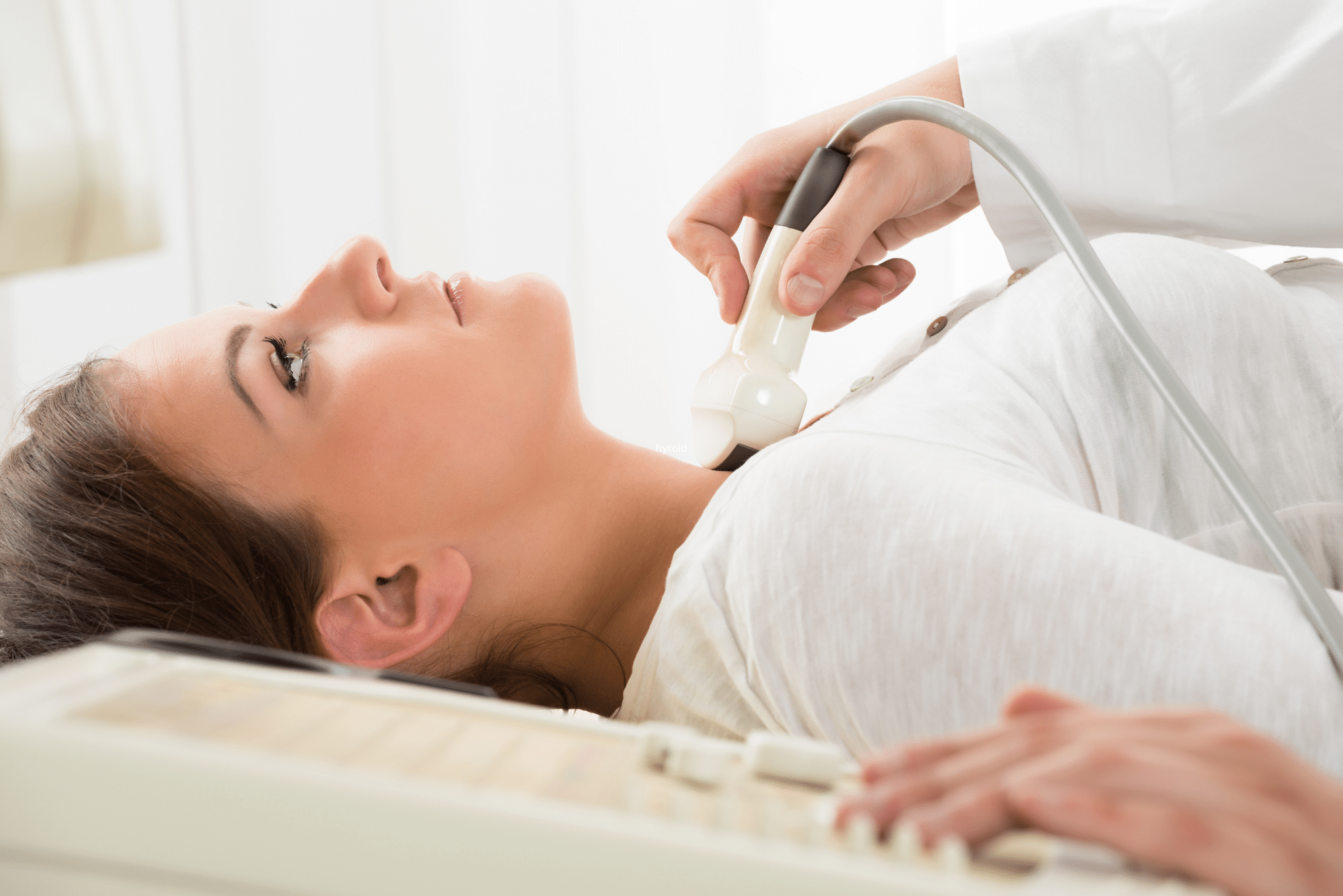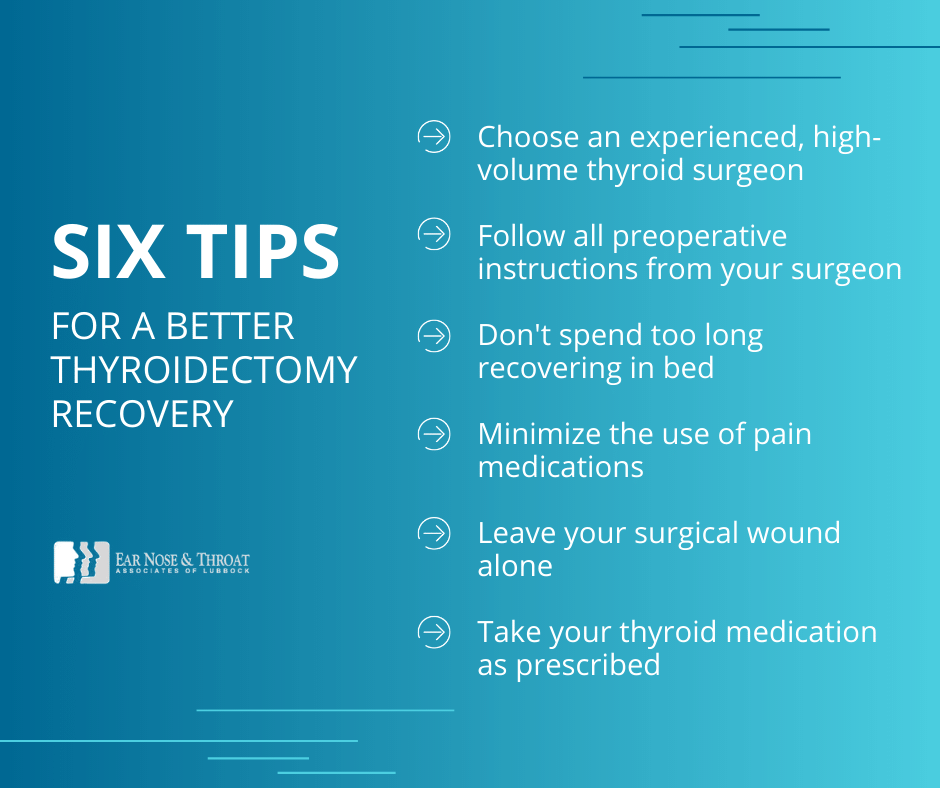6 Tips for a Quick and Comfortable Thyroidectomy Recovery

Very few people look forward to the possibility of surgery.
But beyond fears about the procedure itself, the thyroidectomy recovery process may cause some anxiety as well. Fortunately, there are lots of things you can do to ensure a thyroidectomy recovery that’s as comfortable as possible.
The first thing to know is that thyroidectomy surgery has a very low rate of complications and a quick recovery time.
Next, we’ll take a look at what exactly a thyroidectomy is and what you can do to help your recovery.

What Is a Thyroidectomy?
A thyroidectomy is a surgery to remove all or part of the thyroid gland. The thyroid is a butterfly-shaped gland that sits at the base of the neck in front of the voice box. The hormones it produces play a huge role in the metabolic functions of the body.
A partial thyroidectomy removes only part of the thyroid, while a total thyroidectomy removes the entire thyroid gland. Doctors perform these procedures for a number of reasons:
- Thyroid cancer.
- Suspicious nodules.
- Noncancerous gland enlargement (goiter).
- Overactive thyroid (hyperthyroidism).
6 Tips for a Better Thyroidectomy Recovery
Even though you’ll be under general anesthesia during the thyroidectomy itself, there are plenty of things you can do to help yourself heal and get back to daily life as quickly as possible.
Tip #1: Choose an Experienced, High-Volume Thyroid Surgeon
Vocal cord injury and calcium problems are among the most common complications during thyroidectomy recovery. In most cases, these complications can be avoided by choosing a surgeon who regularly performs successful thyroidectomies.
During your preoperative appointment, ask your surgeon how many thyroidectomies he or she performs each year. Ideally, your surgeon will perform at least 50 to 100 thyroidectomies per year.
Experience is important, but there’s not a set number of years of practice you’re looking for. Instead, find a surgeon who stays current on the latest surgical techniques and who practices evidence-based medicine. An attitude of always improving and striving to be the best combined with performing a high volume of thyroidectomies each year are important factors in helping to minimize complications.
Tip #2: Follow All Preoperative Instructions From Your Surgeon
Your ENT surgeon will give you a list of preoperative instructions to follow before your surgery. These instructions may seem simple, but they’re designed to help you avoid difficulties during your thyroidectomy procedure and recovery.
You will be instructed not to eat or drink after midnight the night before your thyroidectomy. This is to reduce the likelihood of aspirating (breathing in stomach contents) while under anesthesia.
In the week leading up to your thyroidectomy, it’s best to avoid alcohol and tobacco use. Focus on eating healthy foods and getting sufficient sleep (seven to nine hours per night) in the days leading up to your surgery. You’ll also want to shower with antibacterial soap the night before surgery.
Be sure to tell your doctor if you take any blood-thinning medications like aspirin or heparin. Your surgeon will likely want you to stop these medications prior to surgery to avoid excessive bleeding, and you’ll need to consult with your prescribing physician.
Tip #3: Don’t Spend Too Long Recovering in Bed
Rest is an important part of thyroidectomy recovery. But spending too long in bed after an outpatient procedure can actually lead to complications.
While you shouldn’t stop by the gym on your way home from the surgery center, it’s important to include some gentle movements in your daily routine in the days after your procedure. Walking is especially important for preventing blood clots after surgery.
Gentle neck stretches can help prevent neck pain. You can ask your doctor what activities will be safe for you during your recovery period. Most patients can look forward to resuming their normal activities about five days after surgery.
Tip #4: Minimize the Use of Pain Medications
You may experience some neck pain in the days after surgery, but most patients describe this as a mild discomfort. The thyroidectomy incision itself usually isn’t very painful. The discomfort is more often from the neck muscles, but can be alleviated through gentle neck stretches.
Although you may be prescribed pain medicine for your recovery, it’s best to take these medications as minimally as possible. Without narcotics in your system, you’ll be less constipated, less groggy, and more able to participate in normal activities. You’ll also be able to drive sooner after surgery!
Tip #5: Leave Your Surgical Wound Alone
You might be tempted to touch your surgical scar frequently. That’s a normal impulse when there’s a new change to your body. But the best thing you can do to minimize infection risk during your thyroidectomy recovery is to keep your hands off your incision.
After a thyroidectomy, you usually won’t have any visible, external stitches. Your incision will be closed with small Steri-Strips. There’s nothing you need to do to keep them clean, and there are no dressings to change.
If you absolutely must touch your incision, be sure to wash your hands thoroughly with soap and water for at least 20 seconds before and after you touch it. But the best course of action is to keep your hands away.
Tip #6: Take Your Thyroid Medication as Prescribed
After a thyroidectomy, you’ll need to take a thyroid hormone supplement from now on since your thyroid can no longer produce your body’s thyroid hormone.
A thyroid supplement is a simple pill that you take each morning. Your surgeon will order a starting dose for you, but it may need to change. Your surgeon will adjust your dose based on the results of your blood work a few weeks after surgery.
If you only had a partial thyroidectomy, you might need thyroid hormone replacement, but you might not. Your doctor will monitor your blood work results to determine if you need a hormone supplement.
Taking your thyroid medication as prescribed is important in helping you feel your best. If you miss a dose, you’ll likely feel a little sluggish for a day or two. If you miss many doses, more serious complications can arise.
Looking for a High-Volume Thyroid Surgeon?
If you’ve been told that you need a thyroidectomy, you may have more questions about the thyroidectomy recovery period.
The physicians at ENT Associates of Lubbock are high-volume thyroid surgeons with extensive experience. We perform multiple thyroidectomies every week and stay current on the latest developments in medicine and surgery.
A quick and comfortable thyroidectomy recovery begins with choosing the right surgeon. Call ENT Associates of Lubbock today to schedule a consultation. We’ll be happy to answer any questions you have and walk with you all the way through your recovery.
Dr. Scolaro is a board-certified Otolaryngologist servicing the South Plains area. He has been practicing in Lubbock since 1990 and has earned a reputation as a skilled and experienced surgeon. He currently serves as the Medical Director for Covenant High Plains Surgery Center campuses, is a member of Covenant Health Partners and is an adjunct faculty professor for Texas Tech University Health Sciences Center School of Medicine. Learn more about Dr. Scolaro.
Categories:








